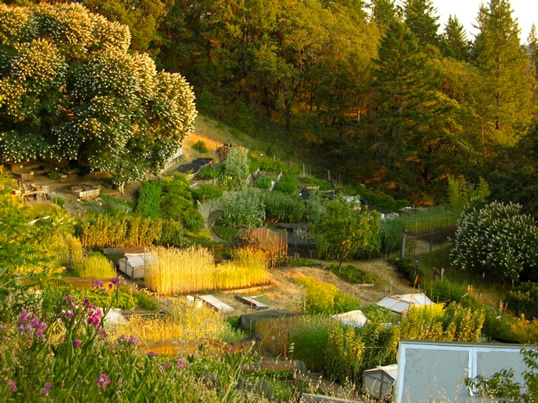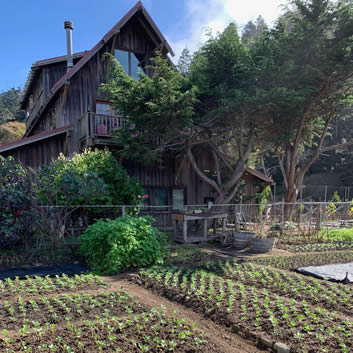Ecology Action and GROW BIOINTENSIVE Closed-Loop Mini-Farming Program
Introduction Even though we are just beginning our 48th year, it is important to reflect, plan and create initiatives. Ecology Action's GROW BIOINTENSIVE (GB) Closed-Loop Mini-Farming Program has a legacy of demonstration, education and research of biologically intensive food- and soil-growing as one of the oldest such initiatives on and for the Earth. In the upcoming decade, we will expand on this foundation. The Jeavons Center Mini-Farm (TJC) Due to financial restraints stemming from the 2008 recession, TJC Mini-Farm in Willits, CA, had to hibernate under a blanket of wooly pod vetch compost and cover crop during 2018. This legume is important as it has the capacity to fix up to 0.63 pound of nitrogen per 100 square feet—in comparison with the approximately 0.21-pound potential of other legumes. 2019 will see the beginning of the Mini-Farm's resurrection of its 110, 100-square-foot growing beds. This is made possible by the very thoughtful contributions of the Ceres Trust, the Warsh Mott Legacy, the Edna Wardlaw Trust, Dr Bronner's Soapmaker and Ecology Action Members! Once before, when we had to let half of the Mini-Farm rest fallow, the soil, built up from the initial poor-for-grazing status (see Journal of Sustainable Agriculture, Volume 19, 2001 - Issue 2 for a five-part article on Biointensive), was fertile enough to produce well the next year. After a year of rest, once again TJC will have staff and GB interns living on-site and working the Mini-Farm. Misha Zaied from Willits will be overseeing the process as Mini-Farm Manager, under the supervision of John Jeavons. Zaied anticipates staying at TJC Mini-Farm for the long term. A Mini-Farm Assistant Manager is actively being sought. In addition, this year we will host two 8-Month Interns, one from Italy and one from Latin America, in the process of being selected. In September 2019, Ike Enahoro, the son of Agaja Enahoro (a former lead Alan Chadwick apprentice at his Virginia site) will be joining us as a 3-Year Apprentice. After his apprenticeship, Ike will become a Farmer/Teacher staff person for which he has given an additional 10-year commitment. Each staff person, intern and apprentice will design and grow an experimental 10-Bed Unit (1,000 sq ft of planted growing area—1,200 sq ft including paths). Each of these units has the potential of growing a complete balanced diet for one person annually, assuming intermediate GB yields, a reasonable level of skill and a well-choreographed design. The unit also has the potential to grow all the compost materials for itself from the well-chosen diet crops and interplanted legumes. Also to be initiated will be the design and growing-out of the first 10 running feet of a living fence, which will be extended to surround the Mini-Farm over the following five years. The fence will be based on the approaches used in the excellent color-illustrated book by Eric Thomas and John T. White, Hedgerow (William Morrow and Company, 1980). The fence involved has the capacity to be a protective habitat for birds and beneficial insects, provide berries and nuts, and keep deer from entering the cultivated area. It can also provide building materials for wooden farm implements and home furniture, including bow rakes, scythe handles, pitchforks, bowls and spoons. The design will be created by David Troxell, forester and husband of Ecology Action's Administrative Assistant, Laurie Birch.
VGfP is continuing its strong demonstration, education and research program in collaboration with Ecology Action and the Stanford Inn. The Mini-Farm is under the supervision of Manager Matt Drewno and Assistant Manager Kimberley Fisher. They have the help of 1-Year Apprentice Brooke Eichenlaub and 1-Year Intern Gabriella Cobb, both of whom will become Farmer/Teacher/Trainer staff in May. Three 8-Month Interns, one each from Puerto Rico, Nicaragua and Latin America, will join the team in April. Also, one each 1-Year Apprentice and 6-Month Intern are in the process of being selected. At least one experimental 10-Bed Unit will be grown in the 200, 100-square-foot beds for which the VGfP is responsible, and a large amount of food will be produced for the Stanford Inn's gourmet restaurant, The Ravens. In addition, Drewno will complete an important EA/VGfP Self-Teaching Mini-Series Booklet 38, Achieving More with Less: Experiments in Growing a Complete Diet in 1,000 Square Feet. This is about the background and details needed for understanding and designing a 10-Bed Unit, and will be published in electronic format in 2019. Educational Localization and Outreach—A World Sowing and Harvest Numerous initiatives are being taken to share Ecology Action's and John's almost half-century of experience and skills locally and globally.
top | Newsletter Home |Table of Contents| Archive
|



 Victory Gardens for Peace Mini-Farm (VGfP)
Victory Gardens for Peace Mini-Farm (VGfP)